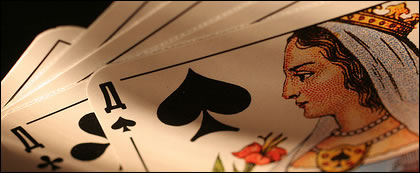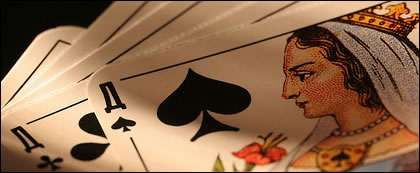
Perhaps you’ve lost some loose change on the street hunting the lady while trying to beat the ‘three-card trick’? This is the one where three cards are moved one over the other and you have to find a particular card. It appears easy when you watch someone else winning but, when you step up to have a go at the makeshift table, you keep losing. The card should be where you think it is, but it’s not. So you lose a bit of cash.
I like card tricks, although the mechanical explanations of their workings are usually disappointing. It always turns out to be some low-level cheating which almost anyone could get the hang of with a little practice. Same with the three-card trick. When you know how the card trick itself is done, you feel like a fool for falling for it. That’s because the trick isn’t really in the cards, it’s in the mind.
The interest for me in card tricks, and in magic generally, is the psychology. The best part is understanding how the magician, or huckster, plays on our human nature to get us to behave in a certain way.
Sheep theory
The three-card trick relies on what is variously known in psychology as ’emergent norm theory’ or ‘crowd psychology’ or what I like to call ‘sheep theory’. My name is better (although less scientific sounding) because it clearly emphasises how much people like to follow each other. Like sheep.
Baaaaaaaaaa!
If I had to explain only one thing to someone who knew nothing about psychology, it would be ‘sheep theory’. Being aware and watching out for this one fact would improve our imaginary naive person’s life no end.
One classic example of sheep theory is Stanley Milgram’s famous electro-shock obedience experiment. Social psychology is filled with endless studies of us copying each other or, in the lingo, ‘conforming to group norms’. It’s not just humans, there’s evidence that chimps conform as well.
Three-card trick
This is why along with telling our imaginary ingenue about sheep theory I would also show them an experienced mob running the three-card trick.
Keeping a safe distance from them I would point out the all-too-simple components. There are the shills pretending to play the game – sometimes winning sometimes losing. Here’s a punter walking up and watching the shills, not realising they are in on the game. There’s another shill explaining how easy the game looks. And there they go, approaching the table.
They say a fool and his money are soon parted but I wouldn’t call our ingenue a fool. They are merely acting just like the rest of us, the way that is often good for us, by fitting in with others and following their lead.
In life the real trick is knowing when to conform and when to buck the trend.

